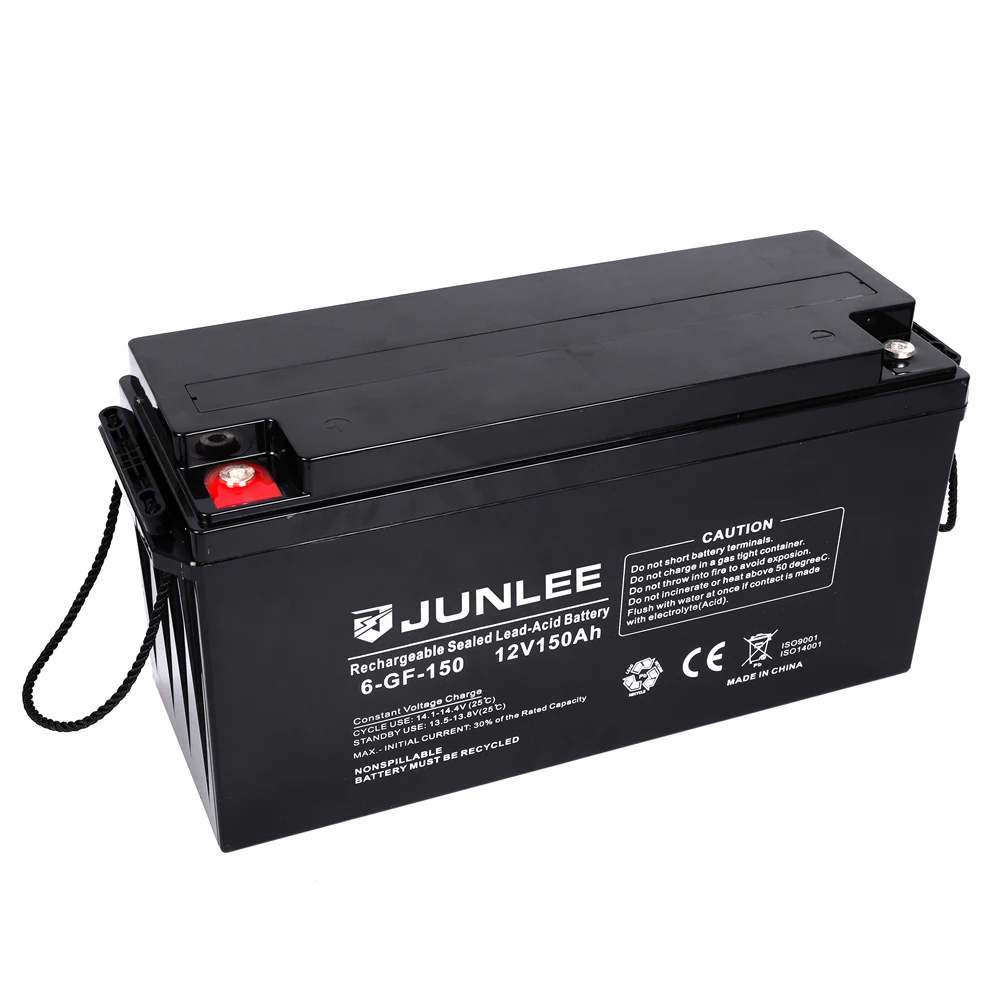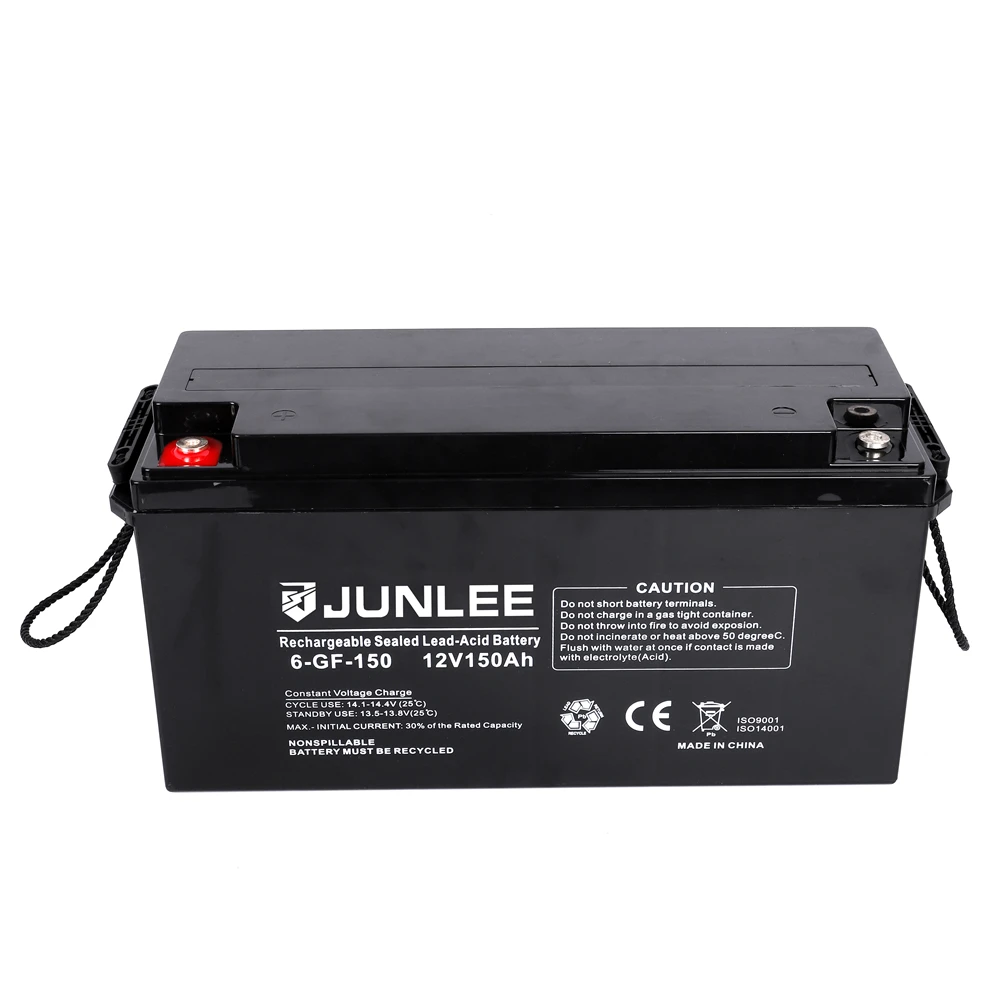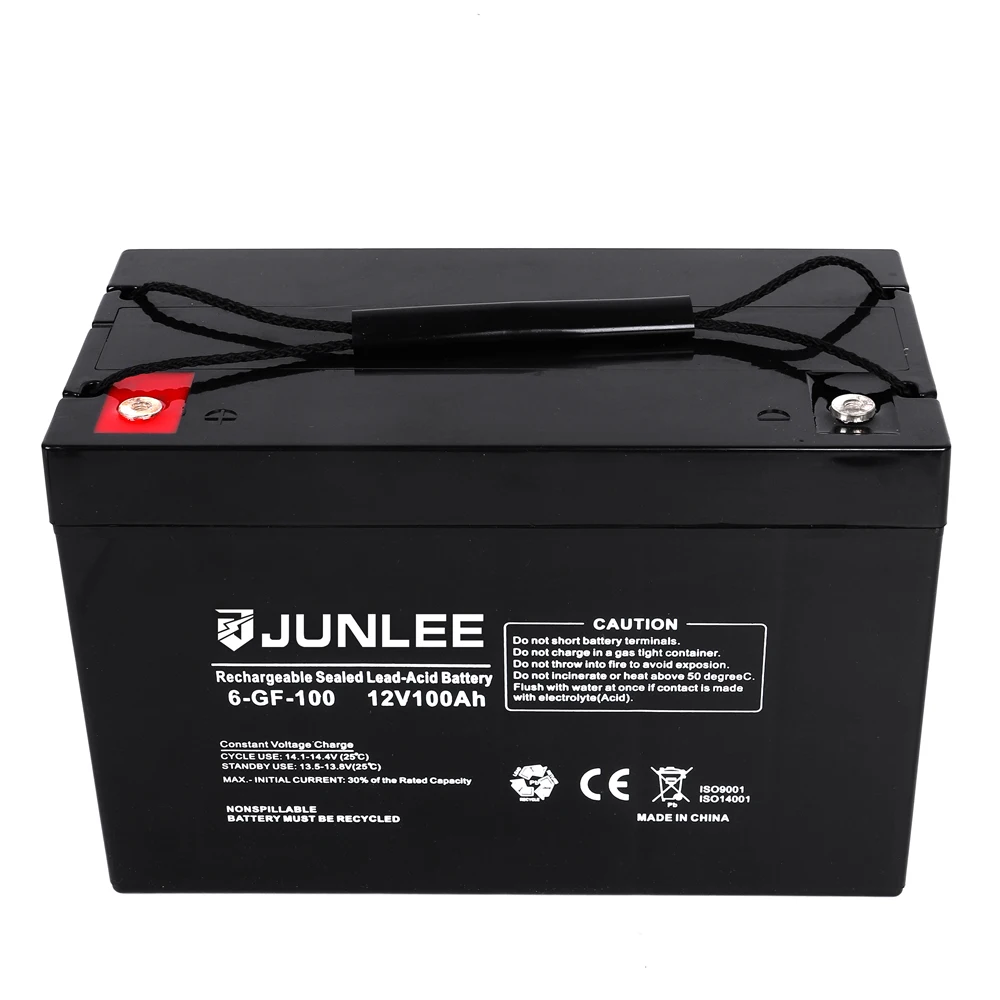Product Description
12V 200AH High Rate discharge battery Deep Cycle Solar Lead Acid batteries
Junlee Energy high rate discharge batteries :
1. Excellent safety performance:
Junlee Energy high rate discharge batteries :
1. Excellent safety performance:
No electrolyte leakage, battery swelling and cracking under normal use;
2. High resistance to high current:
2. High resistance to high current:
The fully charged battery is proved to be without conductive part melted or any appearance deformation after discharging at 2 CA for 5 minutes or 10 CA for 5 seconds;
3. High resistance to overcharge:
3. High resistance to overcharge:
The fully charged battery is proved to maintian normal open circuit voltage and be without leakage or batteries swelling or cracking in temperature of 25 degrees Celsius after chargeing at 0.1 CA for 48 hours, and the capacity maintian over 95%.
4. High resistance to overdischarge:
4. High resistance to overdischarge:
In temperature of 25 degrees Celsius, the fully charged battery discharges with fixed resistance which is equivalent to the one required by 1 CA discharge of the battery for three weeks, and it can restore capacity over 75%;
5. High impact-proof performance:
5. High impact-proof performance:
The fully charged battery is proved to maintian normal open circuit voltage and be without leakage or batteries swelling or cracking after droping three times from 20cm height naturally to a 1 cm-thick hardwood board;
6. High shock-proof performance:
6. High shock-proof performance:
The fully charged and completely fixed battery, with 4mm amplitude and 16.7HZ frequency do have a normal open circuit voltage without leakage, batteries swelling or cracking problem after one-hour vibration;
7. High discharging performance:
7. High discharging performance:
With smooth discharging voltage and mild discharging platform;

Specification
Rated voltage | 12V |
Capacity | 150AH |
Dimension (L*W*H) | 483*170*239mm |
Approx Weight | 43.20kg |
Internal resistance | 3.5mΩ |
Operating Temperature Range | Charging: 0 to 40oC Discharge: -20 to 55oC Storage: -15 to 50oC |
Capacity affected by Temperature | 40 ℃ 106% 25 ℃ 100% 0℃ 85% |
Float Charging Voltage | 13.5 to 13.8V; Recom. 13.5V |
Equalizing Charging Voltage | 13.8 to 14.1V; Recom. 14.1V |
Float Charging Temp. Coefficient | -18mV/℃ |
Equalizing Charging Temp. Coefficient | -24mV/℃ |
Max. Charging Current | 45A |
Max. Continuous Discharge Current | 459A |
Month Self Discharge | 2% (20℃) |
Terminal | T11 (Female M8) |
Container Material | ABS (94-HB) |
Company Profile
Junlee Energy Technology Co., Ltd was founded in 1992, owned three factories , is the industry’s leading company who engaged in reseraching & delivoping, manufacturing and sales of energy lead acid batteries, lithium-ion phosphate batteries, UPS and battery energy storage solutions, the 105 production lines and related testing equipments together with three dedicated battery research and development centers located in Guangdong. Junlee has 50+ subsidiaries in China, the number of staff is over 5000 up to date.
We focus on the development and production of solar panel, VRLA GEL/AGM batteries(12v 7ah-250ah) and lithium iron batteries, customize battery pack(12V,24V, 48V, 72V). Products are widely used in energy storage system, custom lithium-iron phosphate battery solar system, RV, and other fields. Providing ESS solution including lithium-ion battery energy storage system,grid-connect and off-grid solar system, UPS energy storage solutions.
Please let me know if you are interested in our products so I can send you the quotation.

UPS and lithium-ion battery Factory
This factor is focus produce the lithium-ion battery and UPS , total staff 500, more than 100 engineer, with 50 auto-production lines, area is 20000 square meters

Lithium battery cell factory
Lithium-ion phosphate battery cell, area 20000 square meters , 50 auto-machine production lines, total staff 200, maninly produce lithium battery cell

Lead acid battery factory
Lead acid battery factory, area is 20000 square meters, total staff 1000, annual production capability roughly 10GWH, 50 auto-machine production lines
Production

Facilities

Quality test

Exhibition, certification and Application


Certificated and Application

Energy storage power station

Solar panel energy storage system

Lighting residential energy storage

romote rural solar energy system

Medical equipment battery

Golf cart rechargeable battery
FAQ
1) My application calls for the battery to be inserted on its' side. Can a sealed lead acid battery be used on its side?
Yes. The sealed lead acid batteries can be used on its side. The batteries can be installed in any orientation.
Yes. The sealed lead acid batteries can be used on its side. The batteries can be installed in any orientation.
2) Do I need to drain my SLA battery to prevent memory effect?
No. Sealed lead acid batteries do not suffer from memory effect. Draining the battery may result in damage.
No. Sealed lead acid batteries do not suffer from memory effect. Draining the battery may result in damage.
3) What might have caused my battery to fail?
It may have been under-charged or over-charged. Check your charging device periodically to ensure it is working properly. Also, make certain you are using the right chemistry for your application.
It may have been under-charged or over-charged. Check your charging device periodically to ensure it is working properly. Also, make certain you are using the right chemistry for your application.
4) What is the difference between a gel cell, an AGM and an SLA battery?
A gel cell or gelled electrolyte is a sealed battery containing semi-solid electrolyte and may also be identified as a sealed lead acid, AGM(absorbed glass mat) or VRLA type battery. AGM batteries are sometimes referred to as starved electrolyte because the fiberglass mat contained within the cell is saturated only 95% with acid and there is no excess liquid. Nearly all AGM batteries are VRLA or valve regulated. VRLA batteries are designed with a valve that allows the battery to keep a slight positive pressure.
A gel cell or gelled electrolyte is a sealed battery containing semi-solid electrolyte and may also be identified as a sealed lead acid, AGM(absorbed glass mat) or VRLA type battery. AGM batteries are sometimes referred to as starved electrolyte because the fiberglass mat contained within the cell is saturated only 95% with acid and there is no excess liquid. Nearly all AGM batteries are VRLA or valve regulated. VRLA batteries are designed with a valve that allows the battery to keep a slight positive pressure.
5)What is a marine or deep cycle battery?
These are actually different types of batteries. The common marine battery is often rated to marine cranking amps. It is designed to offer a quick shot of amperes in a very short time span. These batteries can provide thousands of starts but can usually only withstand 50 or so cycles. A deep cycle battery is designed with the capability of being discharged and charged hundreds of times. Many of these batteries may be totally discharged or drained before they are ever recharged.
These are actually different types of batteries. The common marine battery is often rated to marine cranking amps. It is designed to offer a quick shot of amperes in a very short time span. These batteries can provide thousands of starts but can usually only withstand 50 or so cycles. A deep cycle battery is designed with the capability of being discharged and charged hundreds of times. Many of these batteries may be totally discharged or drained before they are ever recharged.
6) What is the shelf life of an SLA battery?
All sealed lead acid batteries self-discharge. If the capacity loss due to self-discharge is not compensated for by recharging, the battery capacity may become unrecoverable. Temperature also plays a role in determining the shelf life of a battery. Batteries are best stored at 70 degrees F. When batteries are stored in areas where the ambient temperature varies, self-discharge can be greatly increased. Check the batteries every three months or so and charge if necessary.
All sealed lead acid batteries self-discharge. If the capacity loss due to self-discharge is not compensated for by recharging, the battery capacity may become unrecoverable. Temperature also plays a role in determining the shelf life of a battery. Batteries are best stored at 70 degrees F. When batteries are stored in areas where the ambient temperature varies, self-discharge can be greatly increased. Check the batteries every three months or so and charge if necessary.
7) I understand that batteries can be put together in series or parallel. What does this mean?
Connecting your batteries in series will generate a higher voltage. The total voltage is the sum of all individual voltages.
Connecting the batteries in parallel will increase the capacity or amp hours.
Connecting your batteries in series will generate a higher voltage. The total voltage is the sum of all individual voltages.
Connecting the batteries in parallel will increase the capacity or amp hours.
When you connect your batteries in a "string" (either in parallel or series) and find a battery that is not charging properly, we suggest that the entire string be replaced.






